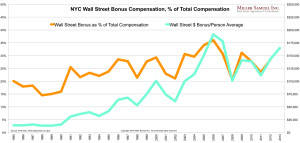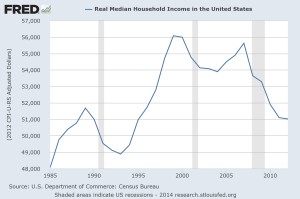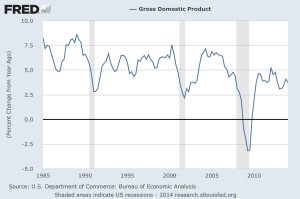Each season CFA Society Minnesota invites finance students to learn about the CFA Program by interning with the local society. Students assist society committees with research for their projects, and are encouraged to take on tasks that broaden their skills and industry insight. Augsburg College senior Kyle Louzoun-Heisler will be sitting for Level I next year, and wrote this commentary with the assistance of Freezing Assets contributor Lissa Rurik, CFA. If you’d like to work one-on-one with a future CFA Candidate this season, please contact us to volunteer!
There seems to be a consensus in the literature of the major financial institutions that stocks, despite a five year bull, will continue to make small but positive gains. They seem to agree that low interest rates, low inflation, and an improving economy will continue to support increases in the stock market, albeit small. However, there are risks, including shifting geopolitical climate, the Federal Reserve, and asset bubbles that pose threats to stock market gains. Despite these concerns, the majority of firms recommend a Bull market strategy.
With the stronger stock market many firms suggest investing in stocks instead of bonds in 2014. However, there are strategies to navigate a rising interest environment. The recent climate has many financial firms predicting a higher treasury yield and a steeper yield curve. The Fed is central to this topic because there is reason to believe the fed funds rate will be increased in the future. BlackRock and Ascent are predicting a modest increase in rates to about 3.5%. However, this is largely based on the pace of tapering. And despite the recent fear over the fed raising tapering ahead of schedule, the meeting minutes show no such thing. Both Ascent and Columbia Asset Management recommend investing in shorter financial institutions debt, rather than utilities and industrials, citing a bank’s ability to pay lower interest on deposits and receive higher rates on loans.
In order to gain in a rising rate environment, BlackRock and US Bank are in favor of investing in munis and high yield bonds. Those in favor of high yield bonds cite the investment climate (with the Fed’s quantitative easing, economic improvement, and low default rates) and interest rate risk as the primary reasons to consider those options. Furthermore, as interest rates increase, high yield bonds can protect from that risk. Although last year high yield bonds offered the best return in 2013, BlackRock believes they will be closer to fair value.
In addition to high-yield bonds, BlackRock and US Bank favor municipal bonds as well. BlackRock mentions that March was one of the three best months for munis in 20 years. However, despite these ending, it still makes sense to look at these bonds because of their tax exemptions.
Although BlackRock mentions the Emerging Markets as a potential investment, Columbia asset management recommends it. Columbia believes that investors should stop playing duration defense. Furthermore, credit risk is preferred to duration risk. Like BlackRock, Columbia mentions the possible increase in the yield curve, but they believe that the curve has already taken most of it in. They say that if you want more of an investment-quality bond, corporate and munis make sense, but that if you have longer latitude it makes sense to look at the EM debt. Although EM debt did poorly last year, they believe it will perform better as those economies improve. Columbia believes global demand to increase and thus EM debt values to react favorably. Abbot Downing also believes that EM debt will improve as those markets grow and will be a good long-term investment.
BlackRock and Columbia are asset management firms.
Ascent is a private wealth management firm- subdivision of US bank.








